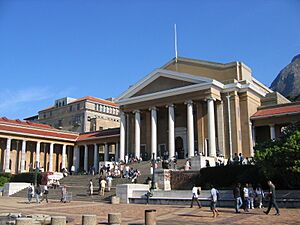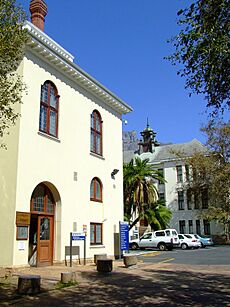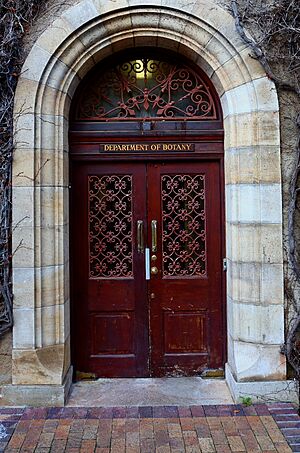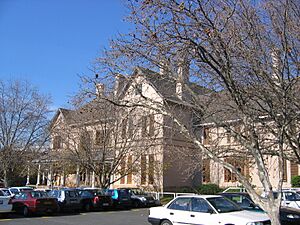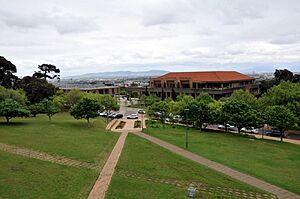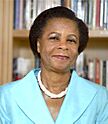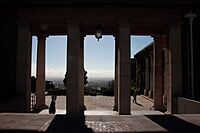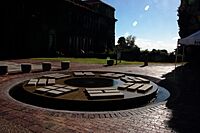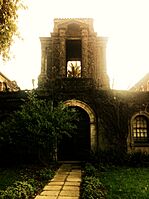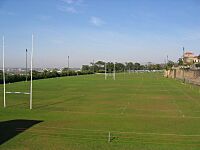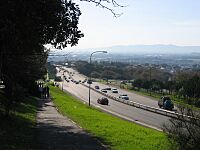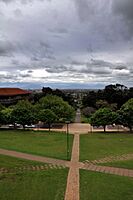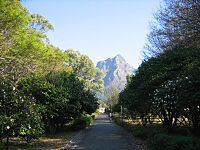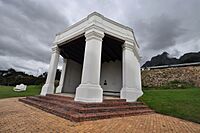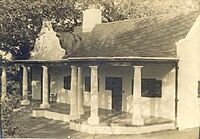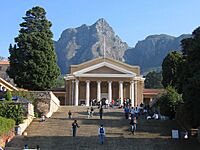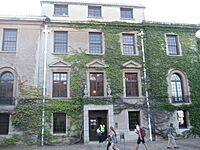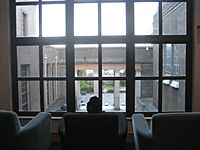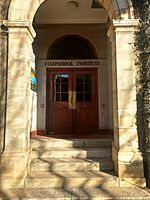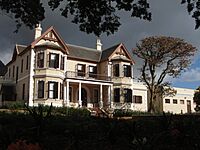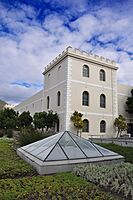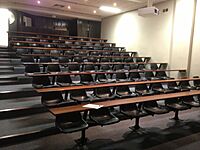University of Cape Town facts for kids
|
|
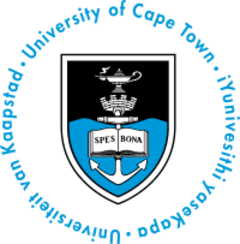 |
|
|
Former names
|
South African College |
|---|---|
| Motto | Latin: Spes Bona |
|
Motto in English
|
"Good Hope" |
| Type | Public |
| Established | 1 October 1829 |
|
Academic affiliations
|
|
| Endowment | ZAR 11.8 billion (US$ 901 million) |
| Chancellor | Precious Moloi-Motsepe |
| Vice-Chancellor | Mosa Moshabela |
|
Academic staff
|
1,176 |
|
Administrative staff
|
3,179 |
| Students | 28,233 |
| Undergraduates | 16,530 |
| Postgraduates | 11,193 |
| Location |
,
,
33°57′27″S 18°27′38″E / 33.95750°S 18.46056°E |
| Campus | 4 suburban and 2 urban campuses |
| Acceptance Rate | 4.85% |
| Colours | Light blue, dark blue, black, white |
| Nickname | Ikeys |
| Mascot | Ikey Tiger |
The University of Cape Town (UCT) is a public research university in Cape Town, South Africa. It is the oldest university in South Africa. It is also the oldest university in Sub-Saharan Africa that has been running without stopping.
UCT was founded in 1829 as the South African College. It officially became a university in 1918. Today, it has about 30,000 students and six campuses. All classes are taught in English.
The university is a member of the Global University Leaders Forum. This group includes 26 of the world's top universities, and UCT is the only member from Africa. Five people connected to UCT have won the Nobel Prize.
Contents
History
How UCT Began
The University of Cape Town started in 1829 as the South African College. At first, it was a high school for boys. In 1874, it began offering some classes for older students.
The college grew much bigger after 1880. This was because gold and diamonds were discovered in South Africa. The country needed people with skills in mining. This helped the college get more money to expand. Between 1880 and 1900, it became a real university. It built science labs and started departments for studying minerals and rocks.
A big change happened in 1886 when women were allowed to attend. Professor Paul Daniel Hahn let four women join his chemistry class. They did so well that the college decided to let all women study there in 1887.
From 1902 to 1918, the university added a medical school, engineering classes, and an education department. It officially became the University of Cape Town in 1918. This was possible because of large donations from people like Alfred Beit.
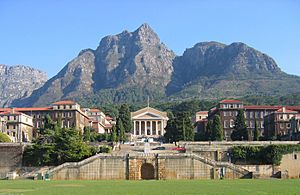
In 1928, UCT moved most of its buildings to a new location at Groote Schuur. The land was given by Cecil John Rhodes. He wanted it to be the site for a national university.
The Apartheid Years
Apartheid was a time in South Africa when people were separated by race. During this period, from the 1960s to the 1990s, UCT was known for opposing the government's unfair rules.
The university began to accept a few black students in the 1920s. However, the number of black students stayed low for many years. In the 1980s, as the country started to change, UCT began to accept many more black students.
By 2004, almost half of UCT's 20,000 students were black. Today, the university is proud to have students from many different backgrounds, making it one of the most diverse campuses in South Africa.
After Apartheid
In 2015, a student protest movement called Rhodes Must Fall started at UCT. The students wanted a statue of Cecil Rhodes to be removed from the campus. They felt the statue represented a painful part of South Africa's history. The protest got attention from around the world. On April 9, 2015, the university removed the statue.
This led to other student movements like #FeesMustFall. Students protested against the rising cost of university fees. These protests led to big changes in South African universities. UCT began to change its curriculum and rename buildings on campus. For example, Jameson Hall was renamed Sarah Baartman Hall in 2019.
In March 2020, UCT opened a Neuroscience Institute. It is a special center for studying the brain and finding treatments for brain-related illnesses.
Campus Life
UCT's main campus is called Upper Campus. It is located on the beautiful slopes of Devil's Peak. This is where you will find the faculties of Science, Engineering, Commerce, and Humanities. The main library, called the Chancellor Oppenheimer Library, is also here.
The Middle and Lower Campuses are next to the Upper Campus. They are home to the Law Faculty, the South African College of Music, and most of the student dorms. The university's sports fields are also here.
The Health Sciences campus is located next to Groote Schuur Hospital. The Fine Arts and Drama departments are on the Hiddingh Campus in the city center.
In April 2021, a large fire on Table Mountain spread to the campus. The Jagger Library, which held many rare and important books, was badly damaged.
Places to Live
UCT has 19 student residences, which students often call "res." These offer a place for students to live while they study. Some are for men or women only, while others are mixed. College House is the oldest university residence in Africa, started in 1887.
How the University is Run
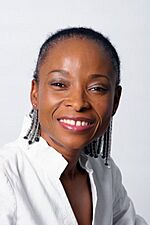
The head of the university is called the Chancellor. This is a ceremonial role, and the person mainly gives out degrees at graduation. The current Chancellor is Precious Moloi-Motsepe.
The person in charge of running the university day-to-day is the Vice-Chancellor. This position is currently held by Mosa Moshabela. The Vice-Chancellor works with a team of senior leaders to make important decisions.
The University Council is the highest decision-making group. It includes representatives from students, staff, and the community. The council makes sure the university is running well and following its goals.
What You Can Study
The university has six main areas of study, called faculties. These are Commerce, Engineering & the Built Environment, Health Sciences, Humanities, Law, and Science. Each faculty has many different departments.
- Faculty of Commerce: Includes subjects like Accounting, Economics, and Management.
- Faculty of Engineering & the Built Environment: Includes Architecture, and different types of Engineering like Chemical and Electrical.
- Faculty of Health Sciences: Includes Medicine, Surgery, and Psychiatry.
- Faculty of Humanities: Includes subjects like History, English, Music, and Art.
- Faculty of Law: Includes Commercial Law and Public Law.
- Faculty of Science: Includes subjects like Astronomy, Biology, Chemistry, and Computer Science.
Students and Staff
In 2018, UCT had nearly 28,000 students. The student body is very diverse, with students from all over South Africa and the world. About 15% of the students are international.
The university is working to have a diverse staff as well. It wants its teachers and staff to represent all the people of South Africa.
Student Activities
Sports
UCT has over 30 sports clubs. The university's sports teams are called the "Ikey Tigers" or "Ikeys." The rugby team is very popular and has a traditional rivalry with Stellenbosch University. They play an annual "Intervarsity" match.
Societies and Clubs
There are more than 80 student societies at UCT. Students can join clubs based on their academic interests, political views, religion, or culture. There are also clubs for special interests, like the UCT Mountain & Ski Club or the Ballroom and Latin dancing society.
Many students also get involved in community outreach. Groups like SHAWCO and RAG work to help communities in the Cape Town area.
University Rankings
| University rankings | |
|---|---|
| Global – Overall | |
| ARWU World | 201-300 (2024) |
| CWUR World | 271 (2024) |
| CWTS World | 451 (2024) |
| QS World | 150 (2026) |
| THE World | =180 (2025) |
| USNWR Global | 116 (2024-25) |
| Regional – Overall | |
| QS BRICS | 22 (2019) |
| THE Africa | 1 (2025) |
| THE BRICS | 10 (2020) |
| USNWR Africa | 1 (2024-25) |
UCT is consistently ranked as the top university in Africa. Different world rankings place it among the best universities globally. For example, the 2025 Times Higher Education World University Rankings placed UCT at number 180 in the world.
Its faculties of Commerce, Law, and Medicine are often listed in the top 100 worldwide.
Famous People from UCT
Five people connected with UCT have won Nobel Prizes. They include:
- Ralph Bunche (Nobel Peace Prize, 1950)
- Max Theiler (Nobel Prize in Medicine, 1951) for creating a vaccine for yellow fever.
- Professor Allan McLeod Cormack (Nobel Prize in Medicine, 1979) for his work on the CT scanner.
- Sir Aaron Klug (Nobel Prize in Chemistry, 1982) for his work in microscopy.
- Professor J. M. Coetzee (Nobel Prize in Literature, 2003).
Other famous alumni include Christiaan Barnard, the surgeon who performed the first human heart transplant, and Mark Shuttleworth, the creator of the Ubuntu computer operating system.
Important Research
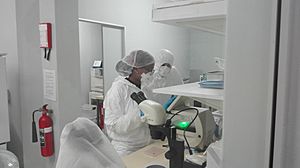
UCT is a leading research university. Some of its important research includes:
- Studying the universe in the Department of Mathematics.
- Designing software for the Large Hadron Collider at CERN in Switzerland.
- Developing technology for the Square Kilometre Array, which will be the world's largest radio telescope.
- Working on vaccines for diseases like HIV and tuberculosis.
- Discovering some of the world's oldest art, such as 60,000-year-old engraved ostrich eggshells.
Gallery
-
The Woolsack Building, where the writer Rudyard Kipling used to stay.
See also
 In Spanish: Universidad de Ciudad del Cabo para niños
In Spanish: Universidad de Ciudad del Cabo para niños
- Centre for Curating the Archive
- List of universities in South Africa
- Education in South Africa
- Chancellor of the University of Cape Town
- Open access in South Africa and List of South African open access repositories
- List of demonstrations at the University of Cape Town
- University of Pretoria
- University of Port Elizabeth
 | Frances Mary Albrier |
 | Whitney Young |
 | Muhammad Ali |


